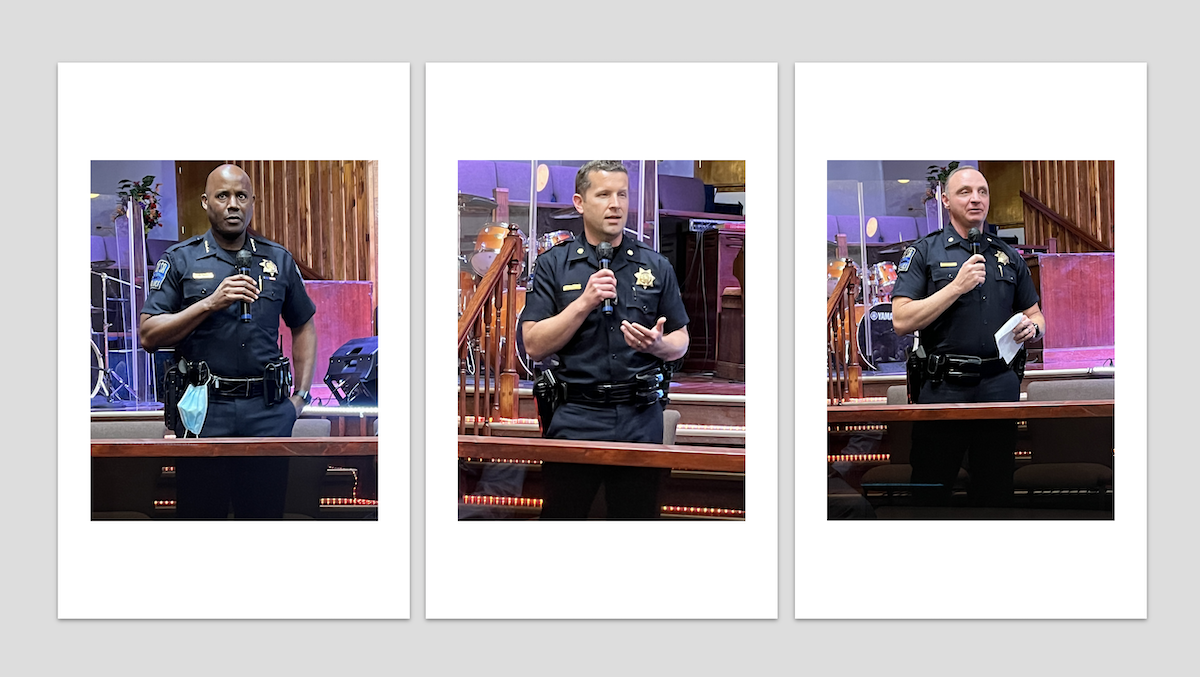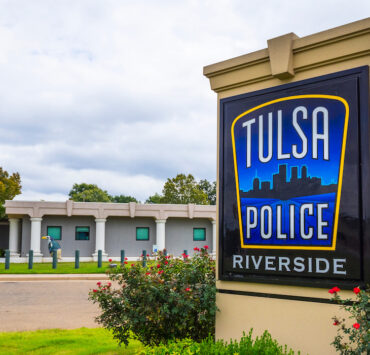Tulsa Police Chief Wendell Franklin faced the wrath of community activists at a forum last Tuesday at the Greater Union Baptist Church in North Tulsa.
Speakers took to the microphone one by one to criticize Franklin on multiple fronts. They assailed his failure to hold members of his department accountable for their actions after they committed acts of brutality. They attacked his failure to promote more minorities to commander positions. They criticized him for not adopting more crime prevention measures. And they also railed on his inability to curtail racial bias in the Tulsa Police Department (TPD).
Several of the most vocal activists are employees of the Terence Crutcher Foundation. The North Tulsa-based organization was established to promote police reform following TPD officer Betty Shelby’s fatal shooting of Mr. Crutcher in 2016.
Joe Williams, a former Tulsa City Councilor, organized the forum. Williams is running for election to the Osage County Commission to represent District Three.
The forum’s purpose was to improve communication and relations between Tulsa Police Department officers and the North Tulsa community.
The forum, held on June 14, drew a packed house. Franklin began the night by giving a speech about TPD operations. Other TPD police officers then followed with accounts of the daily problems that they deal with, including increased shootings and gun violence, rising traffic accidents and fatalities, and increasing homelessness.
Franklin said that the TPD today are dealing with “problems that they never had to deal with before; it’s gotten totally out of control.” He primarily blamed the government for cutting funding for mental health programs. “We’re seeing the consequences of these budget cuts,” he said.
Franklin: “We Need To Communicate”
Overall, the forum seemed to be a humbling experience for Franklin. He graduated from Booker T. Washington and is Tulsa’s first Black police chief. Still, he faced a barrage of critiques. He was even, at times, shouted down. When he argued that OIMs in other cities did not produce effective results, audience members disputed the position.
Franklin told The Oklahoma Eagle afterward the meeting that he found the discussion “spirited.” It provided an indication to him that “we [TPD] need to communicate more effectively” and “interact more with the community.”
Franklin said that he acknowledged many of the people’s concerns but that some of the things brought up were outside his control—including how the city and state governments allocate their budgets. He said in the future, we “need more collaboration” and that “sometimes one has to be made to feel a bit uncomfortable for growth to occur.”
Members of the audience pushed back against Franklin’s defense. They said that while he speaks about the need for greater transparency, he opposes the establishment of an Office of the Independent Monitor (OIM), a citizen oversight body with subpoena power that could help to prevent further police abuses.
Franklin supports a new real-time information center the TPD plans to establish in North Tulsa modeled after one in Las Vegas that will ring the area with cameras, along with a new license plate reader that will enhance police surveillance of people of color.
According to the activists, it is indicative of the lack of concern for public opinion that Franklin and much of the TPD support measures the community does not want (real-time information center and new license plate reader) while opposing measures that they wish to (OIM).
Gun Violence In Tulsa Is Like The Wild West
Major Richard Alexander, who commands TPD officers working in the Mingo Valley district, noted that Tulsa has at least 1800 homeless people and that 38 percent of squad calls are for mental illness or homelessness; problems that the police are not necessarily equipped to handle.
Shelly Seibert, the TPD’s mental health coordinator, recognized that the TPD has only one specialized unit to deal with mental health crises and needs much greater resources in this area.
As far as dealing with growing gun violence and mass shootings, Franklin said, “we’re dealing with the wild, wild west” with the significant number of guns. The best we can do right now is to “prosecute people for firearms offenses;” passing new gun legislation would be a step in the right direction, but it “doesn’t mean we’re all safe.” One major problem, Franklin added, is “how kids are desensitized from violence from all the TV they watch.”
Remembering The Victims
To remind people of the TPD’s thuggery, community activists at the forum called out the names of some victims of police brutality. They include Joshua Harvey, who died after police tased him 27 times, and Joshua Barre, a mentally ill man who was shot by TPD officers after entering a convenience store armed with two knives, and Ladonna Paris, who was severely beaten by TPD officers while having a mental health crisis.
One speaker said that the TPD was carrying out a modern-day lynching of Marcus Harper, a former TPD officer who is currently on trial for allegedly helping to cover up a gang shooting. His wife, Vanessa Hall-Harper, who represents North Tulsa on the city council, is outspoken in defending Black rights, prompting speculation that Harper’s prosecution is politically motivated.
Several speakers said that the TPD’s upholding of white supremacy was exemplified by the presence at the forum of Major Travis Yates, who they said had “broken community trust.”
A 29-year veteran of the TPD, Yates says he helped reduce crime while working in the Gilcrease District where the forum was held. He holds a Master’s in Criminal Justice from Northeastern University, has written hundreds of articles for various publications and is the author of the best-seller The Courageous Police Leader. He caused a firestorm in 2020, when he reportedly told a radio host that police officers were “shooting African-Americans about 24 percent less than we probably ought to be, based on the crimes being committed.”
Yates told the Oklahoma Eagle in an interview after the forum that his comments had been taken out of context. He explained that he currently has two lawsuits against media outlets for defamation. He said that he was analyzing data to try and help develop better public policies and told The New York Times earlier that he never did nor would suggest that the police shoot anyone.
Yates was cleared by the TPD of any wrongdoing.
Yates said people get very spirited and emotional but rarely speak to him. He says he has many friends in the community and uses evidence-based policing models to try and get positive outcomes and solutions.
When asked about Yates, Chief Franklin said he was “part of the police department and had to engage with the community too. We are all fallible and make mistakes and learn from them. You don’t just ex-communicate a person still involved in policing.”









